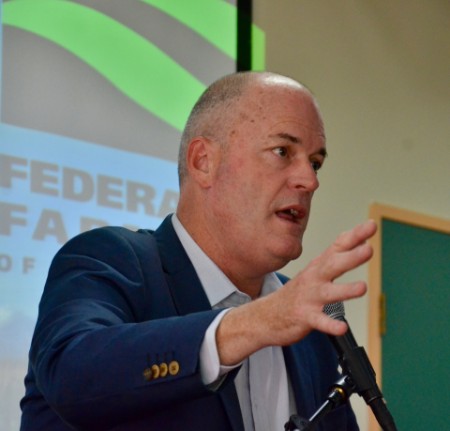National’s support ends if methane targets don’t change
By Simon Edwards
National will not support the Zero Carbon Bill passing into law if “ridiculous” methane targets are not wound back, the party’s climate change spokesperson Todd Muller said.
“I totally reject the view that when there is no ability to mitigate (methane emissions), you just push on regardless,” he told the Federated Farmers Taranaki agm in Stratford on May 24.
Farmers had some tough questions for him on why National had supported the bill in its first reading. Muller said he achieved “about eight of the ten things I wanted” in terms of the framework for a new Climate Change Commission, and it was “better to be in there wrestling for something sensible” than throwing rocks from the outside.
“The issue is going to be in front of us when it’s our (National’s) turn again anyway.
“We’re about to start a Select Committee process that will go for five or six months and we intend to push back very hard…on the ridiculous view that methane has to come down 24-47% by 2050. Quite frankly, if the targets don’t change, our support won’t hold.”
It’s not just methane, Muller said. “I want further forensic testing on the priority of judgements the Commission will make [on economic impact, ability to mitigate, what the rest of the world is doing, etc]. When they’re counter-intuitive, when they’re at odds with each other, what will they do? I want clarity on that.”
It was clear by the late 1980s that modelled impacts of temperature rise 30-40 years out “looked ropey”, he said. By the 1990s concern about climate change had gained global traction.
“Some 25 years on, global emissions are 63% higher than when all those countries got around the table and started ‘angst-ing’.”
The only way the 2015 Paris Agreement got across the line for 190 countries was agreement each nation could essentially design their own way of reducing emissions. It was a National Government which signed on behalf of New Zealand.
National had liked the UK’s Climate Change Commission model “but we didn’t quite get there in terms of a policy position”. When the Labour/Green/NZ First coalition reached out on that model after the 2017 election, National agreed to bi-partisan talks.
Muller told the Taranaki farmers that National’s support hinged on more than half a dozen bottom lines. The Commission had to be advisory; “we vetoed the Green/Labour idea it would be another Reserve Bank-type body”. The gases (carbon dioxide, nitrous oxide, methane) had to be treated differently, because their impact and longevity in the atmosphere is different.
Advice from the Commission to governments needed to be based on broad science.
“The view, expressed particularly from Left of Centre, that somehow climate science is a locked box, and we know what the impacts are, is a complete nonsense.
“I’ve been overseas twice now and sat in audiences where hundreds of scientists have debated the interaction between gases, the other particles in the atmosphere, the ocean and their view of those interactions. If you’re not a scientist, this stuff gets eye-watering very quickly.
“The point is, this stuff is not conclusive.”
As a small country, we have a limited number of specialists on any topic and it’s the same for climate change. “You can’t leave these kinds of decisions to five people. It’s got to be broad and competing science for this thing to work.”
Muller said the speed of our response also needed to be anchored in available technology. Transport – responsible for 20% of New Zealand’s emissions – had solutions such as electric cars. Farmers don’t have significant effective mitigations or technologies, short of reducing production and herds.
Another criteria the Commission must weigh is the global response – “that our trajectory is broadly in line with our trading partners.
“I think this is broadly captured in the legislation as written at the moment but, bluntly, the idea we rush headlong down this path, putting our industries at competitive disadvantage, while our trading partners stay at the nice speeches end of the spectrum and do nothing, is a nonsense.”
Finally, the Commission needs to take into account economic impact. Muller noted the Regularly Impact Statement said the difference between the current emissions target for New Zealand (2015 Paris Agreement) and the Zero Carbon Bill by 2050 was a $45 billion hit on the economy.
Farmers questioned him on the fact they would not be allowed to offset methane by planting trees.
“There is some confusions around this. Two of the three gases (carbon dioxide and nitrous oxide) are able to be offset by planting trees or purchase of carbon units. For methane emissions, if they can’t be reduced, farmers either have to de-stock or the target is overshot. That’s why we’re adamant that target is too high.
“But you can look at your farm and see where there is opportunity to plant trees. Carbon dioxide emitters are desperate for offsets [and you can benefit].”
Muller was scornful of current rules over what trees can be counted for Zero Carbon purposes.
“The idea that we count trees but not if they’re planted in a certain way, not if they’re in shelter belts, not if it’s half a hectare of them….basically it’s indefensible. Our view is that when you have LiDAR, a technology that can accurately capture what’s on your farm at a very precise level – technology which we didn’t have a few years ago – then we should use it.
“There’s a lot of work going on in MPI to change the rules on that. We’ve got to get that done by 2021.”